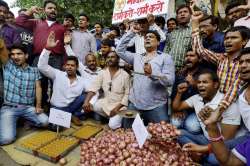Onions selling for as low as 20 paise per kg makes farmers see red in MP
Bhopal (MP): A bumper crop with an average yield of 70-80 quintal per acre has resulted in onions selling at Re 1 for five kilograms in parts of Madhya Pradesh against an asking price of

Bhopal (MP): A bumper crop with an average yield of 70-80 quintal per acre has resulted in onions selling at Re 1 for five kilograms in parts of Madhya Pradesh against an asking price of Rs 80 to Rs 100 per kg until last year.
The low prices may intrigue many consumers who are often left at the receiving end over high prices for essential food items. However, farmers in Madhya Pradesh are faced with huge losses due to the high yield.
Farmers in Madhya Pradesh are today forced to sell their onions at much lower prices because of the high yield. According to farmers, small onions in the Neemuch mandi sold between Rs 20 to 30 per quintal.
As a result of the downfall in prices, onions that are better in quality and bigger in size are going for Rs 300 to Rs 650 per quintal. Acording to farmers, the onion seeds cost Rs 2,000 to Rs 2,500 per kg and an acre of land requires 4 kg of seeds.
Read Also: Relief in sight, IMD predicts above normal rainfall across India this year
Apart from the seed cost, other expenses like labour, pesticide, chemical sprays, and cutting are also involved in the entire produce. During harvesting, a labour charges Rs 150 per day.
Overall, the cost which is incurred by farmers to grow onions is around Rs 25,000 per acre.
According to agriculture experts, farmers are bringing onions in huge quantities but they don’t know what they will do with it.
Problems for the farmers also multiply with the scarcity of storage warehouses that lead to the onions getting rotten with the passage of time.
The downfall in the prices of onions has resulted in huge losses for farmers due to the low prices in the market. Famers are now growing increasingly reluctant to bring their crops to the market, with some feeding it to their cattle in their villages.